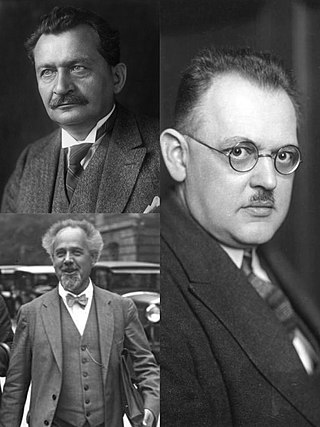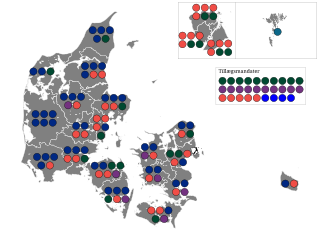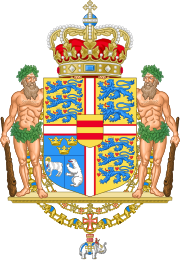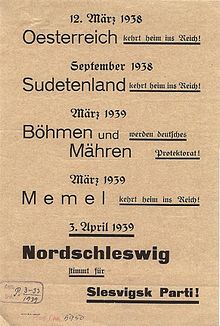
General elections were held in Denmark on 21 September 1971 and in the Faroe Islands on 5 October. The Social Democratic Party remained the largest in the Folketing, with 70 of the 179 seats. Voter turnout was 87% in Denmark proper, 57% in the Faroe Islands and 52% in Greenland.

The Communist Party of Denmark is a communist party in Denmark. The DKP was founded on 9 November 1919 as the Left-Socialist Party of Denmark, through a merger of the Socialist Youth League and Socialist Labour Party of Denmark, both of which had broken away from the Social Democrats in March 1918. The party adopted its present name in November 1920, when it joined the Comintern.

Federal elections were held in Germany on 20 May 1928. The Social Democratic Party of Germany (SPD) remained the largest party in the Reichstag after winning 153 of the 491 seats. Voter turnout was 75.6%.
The Democratic Party is a centre-right political party in Bulgaria led by Alexander Pramatarski. The party was a member of the European People's Party (EPP).

Folketing elections were held in Denmark on 26 April 1920, except in the Faroe Islands, where they were held on 20 May. The election campaign was the most aggressive and bitter in Denmark in the 20th century. Voter turnout was 80.6% in Denmark proper and 58.8% in the Faroe Islands.

Folketing elections were held in Denmark on 3 April 1939, except in the Faroe Islands where they were held on 19 April. They followed a dissolution of both chambers in order to call a referendum on changing the constitution. The referendum was held on 23 May but failed due to a low voter turnout. The result of the elections was a victory for the Social Democratic Party, which won 64 of the 149 seats. Voter turnout was 79.2% in Denmark proper and 47.8% in the Faroes.

Approximately 15,000 people in Denmark belong to an autochthonous ethnic German minority traditionally referred to as hjemmetyskere meaning "domestic Germans" in Danish, and as Nordschleswiger in German. This minority of Germans hold Danish citizenship and self-identify as ethnic Germans. They generally speak Low Saxon alongside South Jutlandic dialect of Danish as their home languages. Furthermore, there are also several thousand German immigrants residing in Denmark with no historical connection to this group.

Elections for the Constituent Assembly were held in Denmark on 5 October 1848. Of the 158 seats in the Assembly, 114 were elected and 44 appointed by the King. An additional 31 candidates were to come from the Duchy of Schleswig but were not elected due to the First Schleswig War.

Parliamentary elections were held in Latvia on 7 and 8 October 1922. The Latvian Social Democratic Workers' Party remained the largest party, winning 30 of the 100 seats.

General elections were held in Liechtenstein on 29 April 1945. Following the "silent elections" of 1939, they were the first to use the new proportional representation system. The Progressive Citizens' Party won eight of the 15 seats in the Landtag, but remained in coalition with the Patriotic Union.

The Civic Workers' Party or Civic Labour Party was a minor political party in Austria during the 1920s. It was led by former imperial foreign minister of Austria-Hungary, Ottokar Czernin.

The Liberal Party, also known as the Radoslavists was a political party in Bulgaria from 1887 until 1920.

The United Labour Social Democratic Party was a political party in Bulgaria.
The Party of Independence and '48, also known mostly by its shortened form Independence Party, was one of the two major political parties in the Kingdom of Hungary within Austria-Hungary, along with the Liberal Party then National Party of Work. During its existence, the F48P strongly opposed the Austro-Hungarian Compromise of 1867. The party was revived after the fall of the Hungarian Soviet Republic and restoration of the monarchy.

The Workers' Party was a political party in Latvia.
The Party of Independents of the East was a political party in Luxembourg.
The Liberal Party was a political party in Luxembourg in the 1930s and 1940s.

Stefan Seidler is a Danish-German politician of the South Schleswig Voters' Association (SSW), the party representing the interests of the Danish and Frisian minority populations in Germany. He was elected to the Bundestag from Schleswig-Holstein in the 2021 German federal election. His election represented the first time the SSW won a seat since 1949. The SSW last contested a federal election in the 1961 West German election.
In 2020, Venstre would drop, mayor at the time, Henrik Frandsen as their candidate for the next election. This led to Henrik Frandsen along with 5 others, to create Tønder Listen, a breakout party who intended to get Henrik Frandsen reelected as mayor.














